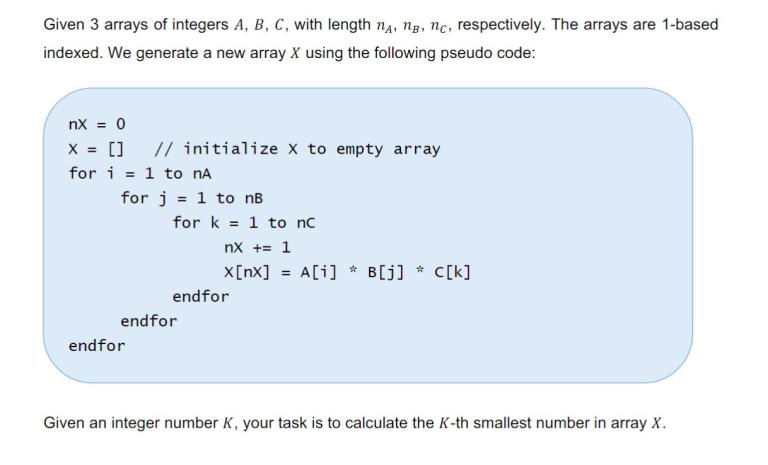101466K - Random Numbers Can any one give me a hint? Thank you!
→ Pay attention
→ Top rated
| # | User | Rating |
|---|---|---|
| 1 | tourist | 3985 |
| 2 | jiangly | 3814 |
| 3 | jqdai0815 | 3682 |
| 4 | Benq | 3529 |
| 5 | orzdevinwang | 3526 |
| 6 | ksun48 | 3517 |
| 7 | Radewoosh | 3410 |
| 8 | hos.lyric | 3399 |
| 9 | ecnerwala | 3392 |
| 9 | Um_nik | 3392 |
→ Top contributors
| # | User | Contrib. |
|---|---|---|
| 1 | cry | 169 |
| 2 | maomao90 | 162 |
| 2 | Um_nik | 162 |
| 4 | atcoder_official | 161 |
| 5 | djm03178 | 158 |
| 6 | -is-this-fft- | 157 |
| 7 | adamant | 155 |
| 8 | awoo | 154 |
| 8 | Dominater069 | 154 |
| 10 | luogu_official | 150 |
→ Find user
→ Recent actions

The length of each array A,B and C <= 1000 and K <= min(10^6, na * nb * nc) (na,nb,nc is the length of each array A,B and C)
I have thought that we can run through array A and B to find all the products of A and B in O(n^2) and generate Kth number by multiply that products with element in array C. But I don't know how to exactly generate Kth number in step 2th.
In this problem, the number can be NEGATIVE
Does anyone help me about this or give me your idea how to solve this problem? Thank you!
Codeforces (c) Copyright 2010-2024 Mike Mirzayanov
The only programming contests Web 2.0 platform
Server time: Dec/23/2024 00:53:17 (k1).
Desktop version, switch to mobile version.
Supported by
User lists


| Name |
|---|









